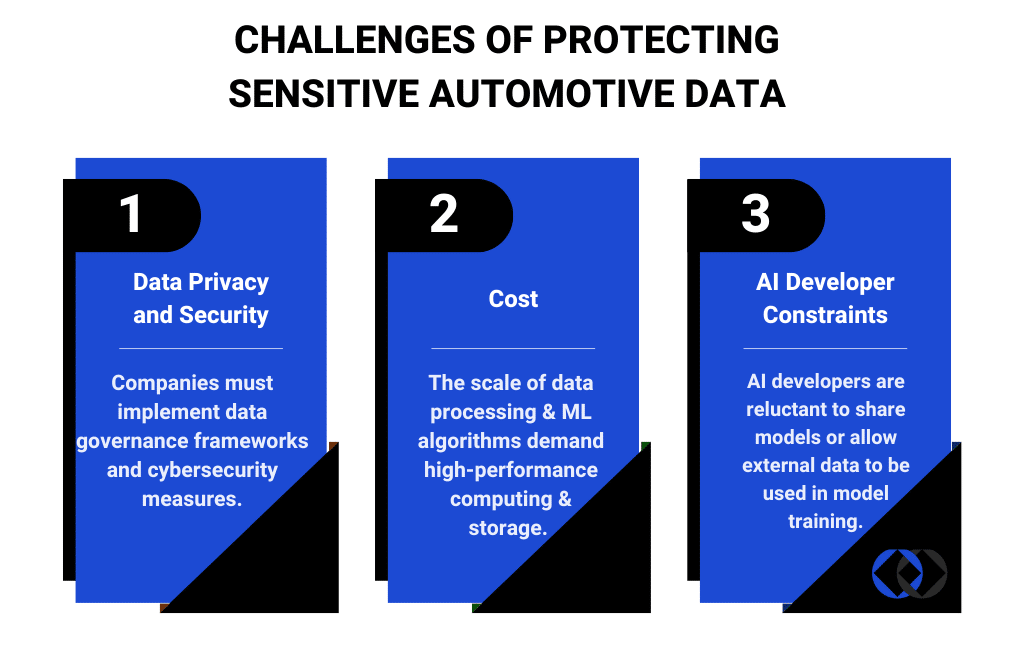The automotive industry has undergone significant transformations over the years, evolving from the early days of mechanical engineering to the current era of digital innovation. This digital transformation is reshaping how automotive companies operate, make decisions, and interact with customers. At the forefront of this transformation is data analytics. By leveraging data, companies can improve operational efficiency, quality management, and overall business intelligence.
Types of Data are Collected in the Automotive Industry
Companies in the automobile industry collect a variety of data from different sources, which can be categorized into several types:
- In-Vehicle Sensors Data: Modern vehicles are equipped with numerous sensors that collect data on speed, acceleration, braking, fuel consumption, and engine performance. This data provides insights into vehicle performance and driver behavior.
- GPS and Navigation Data: GPS systems track the location and movement of vehicles, providing real-time traffic data and route optimization.
- Connected Cars Data: Connected cars transmit data on real-time performance, maintenance needs, and driver behavior to manufacturers and service providers.
- Vehicle Health Metrics: This includes data on fuel efficiency, tire pressure, and engine performance, which are crucial for maintaining vehicle health.
- Environmental Data: Data on weather conditions and road quality, which can impact vehicle performance and safety.
- Maintenance Records: Data related to car repairs and servicing, which helps in predictive maintenance and improving vehicle reliability.
- Marketing Data: Data from marketing efforts, customer engagement, and conversion rates.
The power of data can unlock new opportunities for growth for automotive businesses. However, understanding how to effectively utilize this data is crucial to fully realize the potential of data analytics in the automotive industry.
Big Data Analytics in the Automotive Industry
Big data in the automotive industry refers to the volumes of data generated from the sources mentioned above. The ability to analyze this data can provide companies with valuable insights that drive data-driven decisions. However, these datasets are so vast that traditional data processing tools are inadequate for analyzing them. Instead, advanced technologies and methods are needed to process and derive insights from big data.
Who Uses Automotive Data and How?
Automotive data analytics can be used to enhance operations and drive innovation. These solutions use AI and Machine learning algorithms to extract this valuable data from different sources. Here’s a detailed look at what can be found from deriving automotive data:
Car Manufacturers
Car manufacturers leverage data analytics to improve vehicle design, production processes, supply chain management, and overall quality control.
By analyzing data from in-vehicle sensors, manufacturers can monitor engine performance, fuel efficiency, and other critical metrics, identifying potential issues early in the development phase and ensuring high safety and performance standards.
Fleet Managers
Fleet managers utilize data to enhance the efficiency and reliability of their vehicle fleets.
Fleet managers can optimize routes, reduce fuel consumption, and improve overall fleet performance by analyzing GPS and telematics data. Maintenance data is crucial for scheduling preventive maintenance, reducing vehicle downtime, and extending the lifespan of fleets, ensuring smooth operations.
Insurance Companies
Insurance companies use data analytics to assess risk and offer personalized insurance rates.
By analyzing driving behavior data, insurers can identify safe drivers and offer them lower premiums. In the event of an accident, data from connected cars can provide detailed insights into the incident, facilitating claims processing and fraud detection.
Marketing Teams
Marketing teams in the automotive industry rely on data to understand customer preferences and behavior to drive their marketing strategies.
By analyzing data from social media, customer demands, and sales trends, marketing teams can create targeted marketing campaigns that resonate with specific customer segments, improving engagement and driving sales.
Government Agencies
Government agencies use data to improve traffic management, infrastructure planning, and policy-making.
By analyzing data on vehicle movements, traffic patterns, and road conditions, agencies can develop strategies to reduce congestion and improve road safety, ensuring transportation infrastructure meets the needs of the growing population.
Autonomous Vehicle Development
Autonomous driving relies on data from sensors, cameras, radar, and AI to enable self-driving capabilities.
This data improves driving algorithms, enhances safety features, and supports regulatory compliance, driving innovation in the automotive industry. Analyzing self-driving data helps developers enhance the vehicle’s ability to navigate complex environments, avoid obstacles, and respond to dynamic situations.
Strategies for Leveraging Automotive Data
The best companies are the ones that leverage their data to improve business operations. Here are two effective strategies to use your automotive data effectively:
Trial AI Models
AI model developers rely on large datasets to train and improve their models. By using these datasets, automotive companies can gain significant insights into various aspects of their operations. Here’s how:
- Predictive Maintenance: AI models can predict when a vehicle part is likely to fail based on historical data and real-time sensor readings.
- Manufacturing Processes: AI models can analyze data from manufacturing processes to identify inefficiencies and areas for improvement.
- Product Development: Automotive companies can use AI models to simulate different scenarios and predict outcomes during the product development phase.
These models accelerate the testing of new technologies and the introduction of new products to generate revenue. This allows companies to use real data to make confident decision-making and enable extensive testing capabilities.
Monetize Your Data
Automotive companies can also generate revenue by selling their data to artificial intelligence model developers. This data monetization strategy is becoming increasingly popular, projected to be worth hundreds of billions of dollars by 2030. Here’s how it works:
- Provide Valuable Training Data: AI models require extensive training data to learn and make accurate predictions. Automotive data, which includes vehicle performance metrics, driver behavior, maintenance records, and environmental conditions, is invaluable for training AI models.
- Supporting Innovation: AI developers who purchase this data can use it to develop new technologies and applications that benefit the entire industry. This can include advancements in autonomous driving, smart city infrastructure, and vehicle-to-everything (V2X) communication systems.
- Creating New Revenue Streams: The market for automotive data is growing fast and companies that capitalize on this trend can create substantial new revenue streams. Selling data can provide a steady and growing source of income.
Challenges of Protecting Sensitive Automotive Data
While these two strategies can be used to gain a competitive edge in the automotive sector, they also come with challenges that must be addressed:
- Data Privacy and Security: Ensuring data privacy and security is crucial, especially with the increasing threat of cyberattacks. Companies must implement comprehensive data governance frameworks and cybersecurity measures to safeguard data privacy and security.
- Cost: Implementing advanced data analytics solutions can be expensive, requiring significant investment in technology and infrastructure. The scale and complexity of data processing, machine learning algorithms, and real-time analytics demand high-performance computing, storage, and networking capabilities.
- AI Developer Constraints: AI developers are often reluctant to share their models or allow external data to be used in model training due to concerns about data security and intellectual property rights.
Luckily, Duality Tech offers a solution that addresses many of these challenges, allowing companies to manage, organize, and sell their data.
Secure and Sell Automotive Data with Duality
Duality Tech offers a solution that addresses many of these challenges, allowing companies to manage, organize, and sell their data securely. Created by leading cryptographers and data scientists, Duality Tech’s platform enables secure collaboration on sensitive data, gathering insights and predictive analytics while protecting customer privacy and complying with data privacy regulations.
Key Characteristics of Duality’s Secure Data Collaboration Platform
Accelerate Innovation in AI with Confidential Trials
With Duality’s Secure Collaborative AI, automotive companies can securely trial third-party AI models on their data. This allows them to evaluate the models without exposing sensitive data to the model owner or other customers. Additionally, it protects the intellectual property of the model provider, ensuring mutual benefits for both parties.
Provide Data Trials to AI Model Developers or Their Customers
Automotive companies that collect customer data can use Duality to enable AI model providers or adjacent businesses to train their models on this data. Duality’s platform simplifies operations by providing robust data privacy and security measures, eliminating the need for manual data duplication, cleaning, legal reviews, and security operations. Once approved, the platform can be used seamlessly, ensuring compliance and data protection.
By integrating Duality’s Secure Data Collaboration platform, automotive companies can confidently innovate with AI, protect sensitive data, and maintain compliance with data privacy regulations.
Reach out today to discover how Duality can turn your automotive data into a revenue stream.














